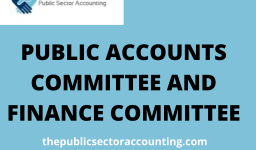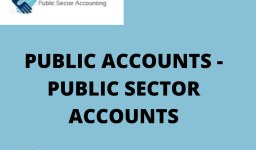You are welcome to The public sector accounting guide, here we provide you anything concerning public sector accounting being questions, answers, and topics in public sector accounting and other related topics in Public sector accounting.
Summary of Contents
PUBLIC SECTOR CASH MANAGEMENT AND CONTROL
This guide of public sector accounting is focused on the public sector cash management and control after studying this guide or chapter of public sector accounting you should have achieved the following learning objectives:
- Explain cash management and control pratices that can be adopted by the government.
- Discuss the various techniques that can be applied in managing cash in the public sector with reference to preparation of bank reconciliatins and cash forecast.
- Explain the various forms of cash books that are operated in the public sector systems with particular reference to treasury cash book and revenue collectors’ cash book.
- Discuss the provision of the Financial Administritive Regulation, Financial Memorandum for Local Government and public sector accounting manuals on cash management.
- Solve the review exercise at the end of the chapter.
WHAT IS CASH MANAGEMENT
Cash management in the public sector is an important aspect of public sector financial management and is concerned with the management of cash inflow and cash outflow of the business concern, cash flows within the business concern, and cash balance held by the business concern at any point of time.
For example, it is an aspect of the Ghana Integrated Financial Management Information System (GIFMIS) that seeks to provide a centralized canopy for government cash balances and provide adequate cash control.
Cash management control refers to the strategies and associated processes for managing individual or government short-term cash flows and cash balances, both within the individual or government and between government and other sectors.
it is principally concerned with the analysis of cash requirement of the various spending units and their liquidity level as well as adopting efficient cash planning and management policies to ensure that, activities are not retired by reason of cash shortage and that excess funds are invested in short term security.
Cash management also involves matching the resources of the government against its expenditure and commitments on regular time intervals so as to provide a monitoring canopy over the usage of government resources.
CASH MANAGEMENT AND TREASURY FUNCTION
Let see some of the cash management and treasury function in the public sector department and other governmental organisations.
-
Cash Office
As part of the treasury function within government organisations, the cash office is required to be established with the praimary function of receiving and paying cash, posting cash and bank transactions into the cash book, opening and managing bank account on behalf of the orqanisation on cheques are drawn and providing information on the cash position at any point in time.
the officer in charge of the cash office is required to recieved and issue official receipt for all cash receipt on behalf of the organisation and also ensure that all payments are authorized and duly approved and are converd with an authenticated payment voucher with all supporting document. the main book kept at the cash office for recording the receipt and payment of cash in the cash book
2. Cash Book
This is a book kept at a cash office to record all cash reciept and payments within the organisation. Basically, there are two types of cash book held at the cash office; the treasury Cash Book and the Revenue collectors Cash Book. Now let take a look at these cash books;
2.1. Treasury Cash Book (TCB)
This is the cash book kept at the treasury to record all forms of receipt and payment. the Treasury Cash Books may have several cloums but normally, it has both the cash and a bank column.
Recording receipt in the Treasury Cash Book (TCB)
- All amount received (in the form of cash, postal order, money order, cheque and electronic transfers) are entered at the cash column on the debit (receipt) sides of the Cash Book.
- Amount paid in directly to the accounts of the organisation is entered in the bank column on the debit side after issuing receipt on production of pay-in-slip.
- postal order, money order, cheques and electronic transfers paid into bank account directly are first entered in the cash column as credit and a contra entry of the same amount, at the same time, is made in the bank column on the debit side.
- all receipt entry is supported by a duplicate copy of general conuterfoil receipt.
Recording Payment in the Treasury Cash Book (TCB)
- All payments are seperately entered on the credit (payment) side of the cash book with cash payment being entered in the cash column and cheque in the bank column.
- when moneys are withdrawn from the bank account, the amount withdrawn is entered in the bank column on the credit side and a contra entry of the same amount be made in the cash column on the debit side.
- Every payment is supported by the original of payment voucher.
Controls in maintaining Treasury Cash Book (TCB)
- In maintaining a treasury cash book, a daily reconciliation of cash on hand and cash balance is effected to reflect the balance on the cash book.
- The cash book is ruled off and balance at the end of the month or at the inspection of the Auditor or at handing over.
- A bank reconcilliation statement is also prepared at the end of the month is prepared to reconcile the Cash Book bank balance with the balance shown on the bank statement.
How to prepare a treasury cash book (TCB)
Let consider an illustration for preparing the treasury cash book
Illustration 1
From the treasury office treasury cash book of the public sector accounting district Assembly, the following balances as at 2nd November 2014 were extracted:
Cash in hand GHS 27,000
Cash at bank GHS 473,000
Additional information
During the month of November 2014, the following transactions of the Assembly occurred;
Nov 2014
| GHS | ||
| 3rd | Property rate received | 27,010 |
| 4th | Cash taken to the bank | 22,000 |
| 5th | Settlement of electricity bills by cheque | 5,400 |
| 6th | Revenue from a lease of landed property paid directly to the bank | 36,000 |
| 8th | Refund of transportation fare to staff | 3,100 |
| 10th | Fines collected by a revenue officer | 65,000 |
| 12th | Reimbursement of imprest by cheque | 10,000 |
| 15th | Market fees | 18,000 |
| 20th | Purchase of stationery by cheque | 2,500 |
| 21st | Payment by cheque to the contractor | 18,100 |
| 21st | Purchase of petrol | 3,250 |
| 24th | Market fees | 17,000 |
| 24th | Cash Taken to bank | 76,000 |
| 25th | Payment of staff salaries by cheque (after deduction tax of GHS2,100) | 36,000 |
| 27th | Fine collected by the revenue officer | 47,000 |
| 28th | Market fines | 15,000 |
| 29th | Fines collected by the revenue officer | 47,000 |
| 30th | Cash taken to the bank | 150,000 |
Question: You are required to prepare the Treasury Cash Book of the Assembly for the month of November 2014.
Solution
The public sector accounting District Assembly
| Date | Particulars | Cash GHS | Bank GHS | Date | Particulars | Cash GHS | Bank GHS |
| Nov 2nd | Balance b/f | 27,000 | 473,000 | 4th | Bank | 22,000 | – |
| 3rd | Property rate | 27,010 | – | 5th | Electricity | – | 5,400 |
| 4th | Cash | – | 22,000 | 8th | Transport | 3,100 | – |
| 6th | Rent Income | – | 36,000 | 12th | Imprest | – | 10,000 |
| 10th | Fines | 65,000 | – | 20th | Stationary | – | 2,500 |
| 15th | Market fee | 18,900 | – | 21th | Contractors | – | 18,100 |
| 24th | Market fee | 17,000 | – | 24th | Bank | 76,000 | – |
| 24th | Cash | – | 76,000 | 25th | Salaries | – | 31,900 |
| 24th | Fines | 47,000 | – | 25th | Tax | 2,100 | – |
| 27th | Market fee | 15,000 | – | 30th | Cash | 150,000 | – |
| 28th | Fines | 47,000 | – | 30th | Balance c/f | 10,710 | 689,100 |
| 30th | Cash | – | 150,000 | ||||
| 263,910 | 757,000 | 263,910 | 757,000 |
Practically, the cash book shows a column for folia where reference is made to show where the corresponding entry is posted to. All the receipts (except contra entry) is reference by the General Counterfoil receipt number and the ledger reference and all payments are referenced by the payment voucher number and the ledger reference






Leave a comment